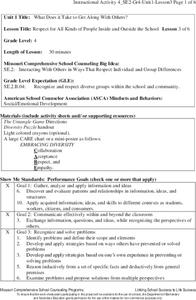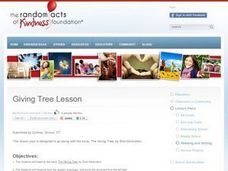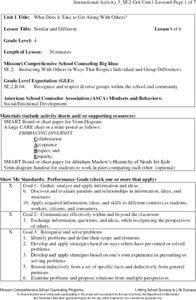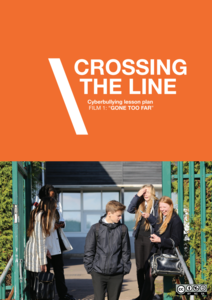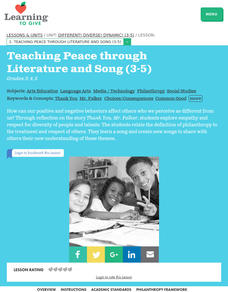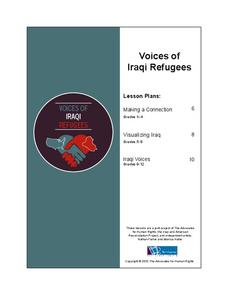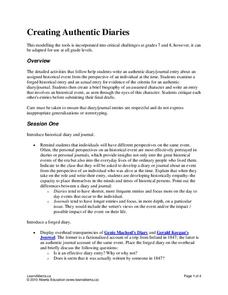Missouri Department of Elementary
Respect for All Kinds of People Inside and Outside the School
Why is it important to embrace diversity? Scholars explore the topic by learning about the CARE acronym: Collaboration, Acceptance, Respect, Empathy. They also complete a diversity puzzle worksheet and play a collaborative game that...
Museum of Disability
Rolling Along
Kindness and empathy can be as important as reading comprehension skills, especially for younger learners. Reinforce both with a instructional activity based on Rolling Along: The Story of Taylor and His Wheelchair by Jamee Riggio...
Anti-Defamation League
Sixty Years Later
Has any progress been made in desegregating schools since 1954's Supreme Court case Brown v. Board of Education? To find out, class members examine charts and graphs representing U.S. schools' racial, ethnic, and socioeconomic...
Curated OER
Lesson: Skin Fruit: Ideas of Empathy in Janine Antoni's Work
Kids get artistic as they explore the impact of art materials, sculpture, and performance. They discuss the work of Janine Antoni and then create a performance piece that reflects social or global issues they feel strongly about. The end...
Curated OER
Health Education: An Integrated Approach; A Day Without Sight
Fourth graders hypothesize about the difficulties they may encounter if they did not have their sense of sight, in order to establish a sense of empathy for the disabled. In this lesson on senses, 4th graders record all of the things...
Curated OER
Learning Empathy Through Art
Students create poems based on the Haiku form and research about WWII. Class discussion and classroom readings of student work finish this activity. Emphasis is placed on Standards in the Arts.
Curated OER
Giving Tree Lesson
Students read and respond the book, The Giving Tree. In this literary unit, students listen to the story and discuss the story using Bloom's Taxonomy. Students write a letter of empathy to the tree and observe the changes the tree went...
Curated OER
Harmony Day - Driven Out
Children explore what life might be like for refugees and people migrating to a different country. Each student lists the five most precious items he/she owns and is then given an extreme scenario to consider. By the end of the exercise,...
Missouri Department of Elementary
Similar and Different
Using a Venn diagram, pupils compare the similarities and differences between two classmates. Next, they review the CARE acronym (Collaboration, Acceptance, Respect, Empathy) and discuss how it applies to diversity in the classroom.
Roald Dahl
Matilda - The Ghost
How do you think the parrot in "The Ghost" chapter of Matilda feels in the chimney? Put a class member in the hot seat and have the class ask questions relating to how they might have felt if they were the parrot in the chimney. Then,...
Childnet International
Crossing the Line: Cyberbullying
Members of the LGBTQ community are more likely to be bullied online than their peers—and bystanders who do nothing can be as problematic as the bullies themselves. Middle schoolers explore ways to protect themselves and others on the...
Curated OER
Lesson: Text Messages
Can a neon sign be considered art? Kids consider two different works that use neon text as the basis for conveying artistic social messages. They then analyze a truism from Jenny Holzer's web site that holds meaning to them personally....
Film English
The Conditioned
Discover the lovely story of Raimundo Arruda Sobrinho with your class. Over the course of the lesson, pupils practice descriptive writing, write short narratives, collaborate in small groups, watch a powerful short film about Raimundo,...
Museum of Disability
Ian’s Walk and Apples for Cheyenne
Help young learners understand friendship and empathy with two reading comprehension lessons. Each activity focuses on a story about a child with autism, and encourages readers to compare and contrast the characters to each other and to...
University of Minnesota
Mirroring Emotions
Do you ever give your class the "teacher look"? Without saying a word, they become silent and engaged (hopefully). How do they know what you're thinking? Explore the concept of nonverbal communication and how it relates to our mirror...
Curated OER
Happy Faces
Students demonstrate empathy. In this character education lesson, students read the book Alexander and the Horrible No Good Very Bad Day and discuss examples of bad days they have experienced. Students are given happy face cut-outs to...
Facebook
Respect and Boundaries
Respect is a must-have in healthy relationships! Pupils explore their boundaries and identify the elements of respect during a lesson plan from a library of digital citizenship activities. The teacher's resource section contains a...
Curated OER
Different! Diverse! Dynamic! Lesson 2: Teaching Peace Through Literature And Song
Students investigate bullying and discrimination and draw pictures of a personal response to being bullied. They read Thank You, Mr. Falkner by Patricia Polacco, to determine the philosophic act that the main character performs. They...
Curated OER
Teaching Empathy : The Story of Ruby Bridges
Students explore "The Story of Ruby Bridges," by Robert Coles to uncover examples of courage in the lives of others and in themselves. This search into the story is meant to help students form connections with others and to foster the...
Equality and Human Rights Commission
Negative Attitudes
A study in the United Kingdom found that approximately 60 percent of workers had heard the term gay used as an insult in the professional workplace. Scholars consider discrimination, negative attitudes, tolerance, and stereotypes in the...
Oklahoma Bar Association
Into Which Caste Have You Been Cast?: India's Caste System
What was it like to fit into a certain class with no choice in the matter? Learners experience the caste system in a role-play activity, work individually on handouts to enhance their learning, and participate in an evaluation activity...
Advocates for Human Rights
Voices of Iraqi Refugees
The stated goal of this resource is to provide learners with basic facts about and build empathy for Iraqi refugees. To do so elementary classes develop a plan for how to welcome refugees to their classroom. Middle schoolers read...
Alberta Learning
Creating Authentic Diaries
Napoleon Bonaparte once said, "What is history but a fable agreed upon?" A series of lessons encourages learners to look beyond the basic fable agreed upon related to events in history and consider multiple accounts of the event. The...
Missouri Department of Elementary
I Know What You Did This Summer
Developing and maintaining healthy interpersonal relationships is difficult, especially as middle schoolers begin dating. A short activity permits eighth graders to practice their skills as they consider how they should respond to a...


